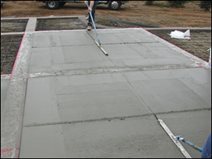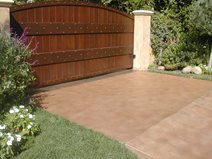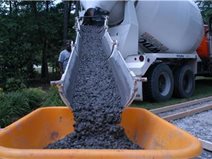- Stamped Concrete
- Stained Concrete
- Decorative Concrete Overlays
- Colored Concrete
- Concrete Polishing
- Concrete Countertops
- Concrete Resurfacing
- Design Ideas for Decorative Concrete
- Concrete Designs: Decorative concrete ideas for patios, floors, driveways, pool decks, countertops, and more
- Six Hot Decorative Concrete Design Ideas on a Budget
- What Is Decorative Concrete?
- Glossary of Decorative Concrete Terms: What is a band? What is a field?
- Types of Textured Finishes: Float and trowel textures, broom finishes, rock salt
- Decorative Concrete Mix Design
- Decorative Concrete Cost
- Maintaining Decorative Concrete
- Cleaning Decorative Concrete
- Concrete Sealers
- Other Resources
- Going Green with Concrete Floors and Countertops: An overview of concrete's eco-friendly benefits
- Concrete Contractors: Find A Concrete Product Supplier or Distributor
Six Wacky Concrete Myths
Concrete has been around for centuries and, for the most part, has earned a stellar reputation as a durable, long-lasting, and versatile building material. Yet several misconceptions about concrete have emerged as well, some due to ignorance and others due to improper handling of the material, resulting in poor performance. Here, we dispel six of the most common myths about concrete so the material can be treated with the respect it deserves.
1. You don't need to maintain it.
In most cases concrete is a durable, long-lasting product, even without routine maintenance. However, you can greatly extend the life and beauty of decorative concrete by keeping it clean and sealed. See these how-to tips for properly maintaining concrete slabs, floors and countertops.
2. It will ALWAYS crack.
It's true that a bad concrete mix, poor placement procedures, and a lack of control joints (which help to keep cracks in check) can lead to cracking. But when the job is done right, your concrete should remain crack-free. See the most common reasons why concrete cracks and what you can do to prevent it.
3. A concrete driveway is more expensive than asphalt.
Actually, this myth has some merit -- if you only consider the initial installed cost of asphalt vs. concrete. In the long run, though, concrete is actually more economical because it has a much longer service life and is less costly to maintain. What's more, you get a more aesthetically pleasing surface, which increases the value of your home. See this overview of concrete driveway price ranges.
4. It can't be placed in cold weather.
Thanks to new admixtures for cold-weather concrete placement, you can place decorative concrete outdoors even when the temperatures drop below freezing. Learn more about the dos and don'ts for placing concrete in cold weather successfully.
5. The more water in the mix, the better.
Never let a concrete contractor convince you that he needs to add more water to the concrete mix so it's easier to place and finish. Keeping the ratio of water to cement in concrete low results in greater strength and durability. Adding more water than necessary is likely to lead to spalling and surface cracking. Learn the optimum water-cement ratios for high-performance concrete.
6. Because concrete is a manufactured product, it's not eco-friendly.
Although concrete is manufactured in a plant, it's generally made from natural material, such as lime, and recycled or salvaged products, such as fly ash and crushed rock. It's also made locally, reducing the consumption of fuel for transport. Read more about the green attributes of concrete floors, homes, and pavements.
Find a Decorative Concrete Contractor
Concrete Contractors: Find A Concrete Product Supplier or Distributor









